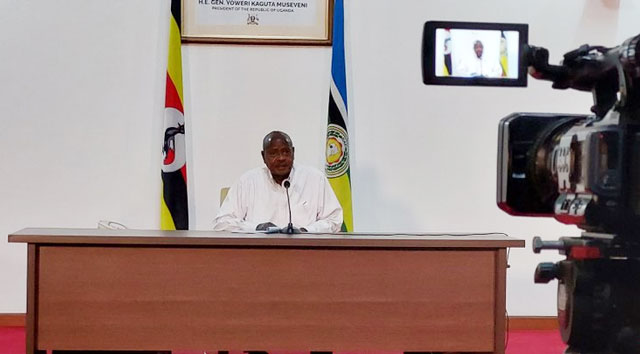
Kampala, Uganda | THE INDEPENDENT | President Yoweri Museveni’s Sunday evening address to the nation was largely aimed at responding to the escalating prices of essential commodities, or at least that is what most Ugandans expected.
His explanations of the situation drew criticism, as many Ugandans thought he was blaming the wrong factors to cover up for the “incompetence of the NRM government.”
The president started by blaming the higher global demand for commodities than output especially since mid-last year, when economies started opening up after COVID-19 lockdowns.
The rising crude oil price had a spillover effect to the final user of petroleum products, which in turn influenced transport and the cost of other goods and services. As the petrochemical industry was being affected by this, the invasion of Ukraine and Russia in February disrupted supplies from those countries, not only of fuel, but also of staple foods like wheat and edible oils as well as fertilisers.
However, the government has come under criticism for failure to put in place measures like adequate fuel reserves, as well as improve the agriculture sector to cushion against global shocks.
Others feel that Uganda is too disconnected from Russia and Ukraine geographically and economically to be affected by the geopolitical developments happening there. The President made it clear that the government will neither introduce subsidies nor waive taxes on the affected imports, especially fuel and foodstuffs, saying these were dangerous for the economy. He instead advised Ugandans to be frugal in their spending and look for alternatives to the expensive imported items, as the government continues to implement its development plans.
Katikamu South Constituency MP Kirumira Hassan, said the President lacked the charisma and practical solutions that majority and ordinary citizens wanted to listen to give hope in the wake of the biting economy.
Kirumira observed that the President sounded so green yet he could have benefited from the technical analysis of the economic experts in the country to devise solutions to deal with the prevailing situation.
Meanwhile, Sarah Opendi, the District Woman Representative for Tororo advised Ugandans to consider spending wisely with their little financial resources at hand to avoid fangs of the biting economy than to bank hope in the government.
The prices of most imported and domestically manufactured products such as wheat, soap, cooking oil, sugar, fuel and other products have been increasing since 2021.
As a result, pushing the inflation rate in the country up from around 3.2 percent in November to 4.9 percent in April 2022.
In response, Permanent Secretary and Secretary to the Treasury, Ramathan Ggoobi, welcomed the President’s submissions. “A simple and nuanced explanation of the current painful but temporary problem of high consumer prices. Shall follow the guidance and avoid distortions (subsidies and tax cuts) that would cause more harm than good,” he said.
Allegations that the well-facilitated President and his ministers have abandoned the poor citizens to suffer, Ggoobi, an economics lecturer, said even government offices and officials have been affected by the measures.
“Absolutely. We declined the request to increase money for fuel for public officers due to price increase. Everyone should live with the constrained budget like all other Ugandans are doing,” he said.
The President argued that waiving of taxes on affected products like fuel, wheat and crude vegetable oil, as well as on local products like cement, steel bars and sugar, would reduce the government revenues by more than 4 trillion shillings, and affect service delivery.
He adds that subsidies will also affect government performance because more people will demand for fuel which will have become cheaper to the consumer, but costly to the treasury.
In the end, he says this will also affect government’s foreign reserves, and put it at the risk of becoming bankrupt.
Some countries, including in Africa have either introduced or increased subsidies on fuel or lifted some taxes to mitigate the effects of the rising prices. True to Mr Museveni’s fears, some countries which subsidise fuel, including Ghana, Nigeria and Rwanda, have encountered challenges including sharp depreciation of their currencies, high inflation and protests.
The protests in Kenya by marketers arose from the failure by the government to release the subsidy money in time and the companies reacted by hoarding the fuel and in some cases, smuggling it to neighbouring countries including Uganda.
On its part, Tanzania opted for the waiver of the petroleum levy of 100 shillings (157 Ugandan shillings) per litre, and the cost of fuel at the pump has remained lower by about 450 Ugandan shillings than in Uganda, though they have the advantage of being a coastal country unlike Uganda.
In the developed world, countries that announced subsidies in response to the rise in fuel prices include Japan, which plans to waive some taxes if the current prices persist for more than three months above 160 yen (4,600 shillings) per litre.
In France, the government had in March already spent 22 billion dollars “to moderate energy costs,” while oil giant TotalEnergies announced a discount of 10 cents (360 shillings) per litre at domestic petrol stations, according to chief executive, Patrick Pouyanne.
Other countries include South Korea which is using tax waivers, Philippines and Malaysia with subsidies, and Brazil which is using both measures.
The President’s speech also irked some who had expected immediate solutions. Richard Niwamanya, a resident of Kampala said the President had not given any solution to the poor. “On the basic things they need like soap, salt, sugar and fuel he has not helped them,” he said.
On his part, John Newman proposed some solutions. “Reduce the cost of governance, eliminate unnecessary non-beneficial expenditure, halve the salary of ministers and MPs. And as a long term permanent solution, reduce the number of MPs to just 100,” he said adding that these would go a long way in providing government with buffer cash.
Jane Nalunga, the Executive Director of SEATINI Uganda, a tax and trade rights regional NGO, agreed with government on local alternatives as inputs if the farmers if given their due benefit.
“We are crying about the increased prices of cooking oil but we have substitutes like sunflower which in four months brings harvest. But the farmer must get the price,” she said.
Kira Municipality MP, Ibrahim Ssemujju Nganda said the President was being unfair telling Ugandans to be frugal when the presidential budget was being increased for the next year, with items the Opposition Chief Whip finds unnecessary.
*****
URN
 The Independent Uganda: You get the Truth we Pay the Price
The Independent Uganda: You get the Truth we Pay the Price



the president is not fair about what he is saying